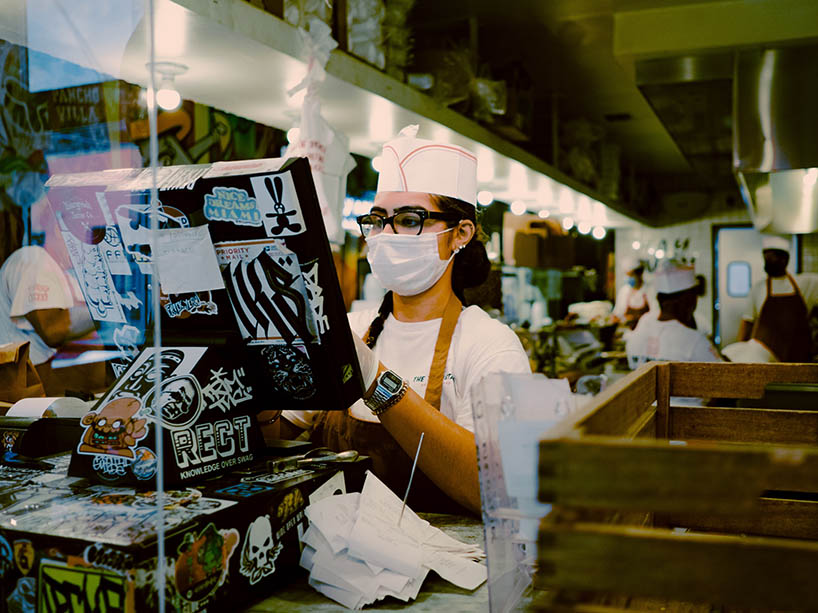Young workers are organizing for change and TMU hub is helping

With inflation at a 40-year high and companies citing labour shortages, TMU’s Young Workers’ Rights Hub within the Faculty of Arts hopes to set students up to advocate for themselves and others
While the pandemic ravaged many sectors of the workforce, especially ones where young workers tend to predominate (external link) , we are seeing a real rise in worker activism and labour movement organizing as a result. And students are getting on board in big ways.
One space on TMU’s campus is setting out to support students as they now navigate challenging work conditions: the Young Workers Rights Hub, located in the Faculty of Arts.
“Job prospects for students now are probably better than they have been in years for a whole bunch of reasons,” says Myer Siemiatycki, professor emeritus in the Department of Politics and Public Administration, and the Hub coordinator. “The pandemic took a terrible toll on young Canadians, and here we are in summer 2022, and the headlines now are all about labour shortages and how employers are desperately needing workers.”
But working conditions have not necessarily improved, says Siemiatycki. “The mission of the Hub,” he notes, “is to promote student awareness of their rights at work, and how to exercise them. TMU is the only university with a unit dedicated to supporting young workers rights.”
The Hub carries out its mission in a variety of ways. It has organized webinars on a variety of workplace topics. The Hub website provides information about labour laws and workers rights, and has hosted an on-campus meeting of students and young activists from the United Food & Commercial Workers (UFCW) union. Participants discussed their work experiences and strategies to make work better.
One of the participating young UFCW activists was TMU graduate Greta Whipple (external link) (Performance-Acting ’18), who led the recent, successful unionization campaign (external link) among workers at Indigo-Yorkdale. Explaining the reasons why store workers wanted to form a union, Whipple says: “COVID really was the straw that broke the camel's back. We had all been laid off when the lockdowns started. And when we reopened sometime in May, we came back into these jobs having had the time away to reassess and started asking ourselves: what am I doing here? What am I putting up with and how can I advocate for my rights?”
Josel Gerardo (Politics and Public Administration ’21), who now works in the Office of the Dean of Arts, has actively engaged with the Young Workers Rights Hub. She believes young workers are now determined to make their work better. “Some students are really struggling to find meaningful employment, and ensuring that their voices are heard in the workplace,” she says.
Siemiatycki, a labour historian by training, finds the current wave of young worker activism inspiring: “My scholarly background is in labour history, and you'd have to go back a long time to find as much resolve on the part of workers to make things better. There’s a lot of optimism to be taken from the fact that young workers want to make a difference and want their voices to be heard.”
The Hub is helping to show students how to start. “Through the sessions held at the Hub, it seems like we're learning ways to address these problems. They’re empowering students to know and leverage our rights in the workplace,” says Gerardo.
Going forward, the Hub has launched a major externally funded research project, jointly led by Siemiatycki and Sociology professor Andie Noack, exploring young workers’ employment experiences and their capacity to make work better.
Learn about your rights
Though there may now be more opportunity for young workers, Siemiatycki says the rewards and remuneration from employment are also being significantly eroded. “I think any number of interesting cross currents could emerge. There's nothing like seeing your real wages decline due to inflation to motivate and mobilize workers. I think as long as those two things go together: openings being pretty plentiful and inflation rising ever upward, we are in a very activist-friendly economic environment.”
In this time, what can young workers and recent grads do to better advocate for themselves? A few things, says Siemiatycki.
Number one, they should know that they have some leverage that they haven't had for years. “We're being told every day there are worker shortages and that positions remain unfilled.”
With this in mind, Siemiatycki advises young workers to know their rights in and out.
“I think many young people are unaware that there are extensive legislation, laws and regulations related to work – with respect to everything from discrimination and harassment to wages, the amount of work hours including overtime, what additional compensation you may be entitled to, including paid holidays, vacation and sick days,” says Siemiatycki.
“And the last thing I'll mention that has gotten a lot of attention in recent months are the legal provisions for the right to unionize to establish a collective and powerful voice in shaping their working conditions.”
To familiarize themselves with workers’ rights in Ontario, Siemiatycki says students should visit the Know your rights page on the Hub’s website to find several documents that provide an overview of the legislation.
“The one that I especially recommend is ‘ (PDF file) Your Rights at Work (external link) ’ – I’d say read that like you’ve got a final exam on it, because it covers the entire landscape of labour law and labour rights in a very accessible way,” says Siemiatycki. “The Workers Action Centre (external link) produced the document, which is probably the most dynamic worker advocacy organization in the city, and their executive director, Deena Ladd, is a graduate of TMU.”
Know who to contact
If students do run into work problems, Siemiatycki says knowing who can help is another important step.
“Over the last year, Hub webinars have covered a wide range of topics including discrimination and harassment at work, gig work, equitable employment for youth with disabilities, making restaurant work better, and what unions do. Viewing past webinars on the Hub website would be informative,” says Siemiatycki.
But Siemiatycki says if your workplace is unionized, start there to address any problems. “Definitely get in touch with the union that represents you, and if you’re not unionized, look into establishing a union which more and more young Canadians are now embarking on.”
Knowing your options before you quit can help, and might even make conditions better for your co-workers as well. “When you run into difficulties at work in this labour market, one option is to quit,” says Siemiatycki. “Maybe a better option is to stay and try to make it better for yourself and for other workers. Unionization is a group of people deciding they want to have more voice and that can be an incredibly powerful experience of bonding over a shared commitment.”
Leading a successful union drive

In 2021, TMU alumna Greta Whipple played a key role in unionizing the workers at Indigo-Yorkdale, with the United Food and Commercial Workers union, which represents grocery store, retail and restaurant workers.
Greta Whipple thought once she’d graduated from TMU, that was that. But as a speaker for the Hub, she’s been back to talk about labour rights - one of her great passions.
“I participated with the UFCW in a one-hour Hub zoom webinar on why union organizing is gaining steam again,” she says. “So often I feel like you have to be prepared to debunk myths or historical misconceptions about unions. But having a group of people through the Hub who were interested in what I had to say about unionization, that was really neat. So it was just really nice to be in such a positive space.”
Nathalie Vengal from the United Food & Commercial Workers Union speaks with TMU students through the Young Workers Rights Hub on the value of unions in the workplace.
Whipple says that if there’s anything positive to be gleaned from COVID, it’s that these conversations are being had with greater frequency. “I think there’s a whole generation of workers that’re tired of being treated so poorly and a system that’s punitive. And I think that directly stems from how much of society is sort of on fire right now.”
Word travelled fast around the country in the wake of her store’s unionization, and there’s great power in a single union victory. Whipple says she and her fellow workers benefitted greatly from speaking with other unionized workers. “We connected with unionized stores to see what they’d gone through,” she says. “So many people have the desire to start a union drive, it’s just a matter of finding out how to do it.”
For that, Whipple says reach out (external link) - be it to the Hub, other workers, unions - or even to her. “My advice would be to talk to someone in your life who might be represented by a union. Even if it's not in the sector that you are employed, the sentiment is going to be the same. They'll be able to speak to what the union does for them.
“Social media has also been so helpful because you can connect with people in different parts of the country. Message these accounts – reach out. People are going to be willing to have this chat because they're passionate about it. They want other people to succeed.”
Whipple says she’s proud of the work she and her team have done to unionize, and she’s proud the labour movement is gaining steam among young workers. “People are figuring out how they can have a say in the terms of their employment and how they can secure that for themselves. It's nice seeing people able to be their own advocates.”
To learn more about your rights as a young worker, visit the Hub website.